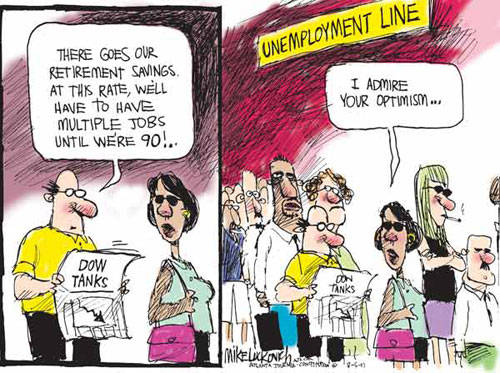The government is not the only entitiy guilty of depending on credit economy. All too many people are unwilling to wait for medium size ($200-$1000) purchases, choosing instead to buy on credit for those big plasma screens, computers, smart phones, etc. And then they find themselves using more of their monthly income to maintain their revolving credit lines, which in turn prevents them from setting cash aside for emergencies. Much of these types of economic woes are far more due to simple lack of planning and lack of convention "old fashioned" money managing skills, than they are due to a poorly performing economy. Even in the 90s under a booming economy, the numbers of people who could cover a $1000 emergency without relying on some type of credit was over 50%, because despite the booming economy, personal debt was rising at a precipitous rate.
It is all at matter of attitude. The government cannot come up with adequate spending cuts to reduce the deficit because one or another factions are firmly convince that each and every piece of spending is absolutely essential - and none of it can wait or be reduced. Similarly, in the private sector, people are firmly convinced they cannot possibly wait another two or three months for the newest iPhone release or other similar type purchase. The result is an economy which is almost entirely dependent on deficit spending, be it governments or households. The only winners in that world are those making the loans and collecting the interest and loan fees.
The maintenance off private debt costs several hundred billion dollars per year. That, like the national debt, is not sustainable over the long run. This phenomenonn is also why we have been on a slowly accelerating cycle of economic growth and recession. Each time the private sector spend enough on credit to reach the upward limits of available credit, spending contracts, and so does the economy. Then the government makes some changes, either to the prime rate, or to the banking laws so more credit is available, people start spending again - on more credit - and the economy picks up, only to slow down again as credit limits are once again stretched to the limits. The housing bubble and subsequent financial crisis was due primarily to over-extension of mortgage credit, with banks, at government's insistence, making sub-prime loans with temporarily subsidized payments to people who could not afford the mortgage. When the balloon payments and higher mortgage payments kicked in, the house of cards collapsed. And while people point fingers at which government agency or political party is most responsible, the bottom line is people were buying more than they could reasonably afford using government-enhanced credit to do so.
With a few exceptions of the truly brain dead, most people are now calling on government to bring spending under control. But what we also neeed is for the entire private sector to kick the credit economy habit. It's not that hard to do, either. Say you want a new iPad. Instead of hauling out the credit card and buying an iPad today, then paying the full price of the iPad, plus interest charges equaling anywhere from 20% to 200% of the original price depending on the time it takes to pay off that debt, the better option would be to set aside an amount each week, say $25, and buy the new iPad when the savings is enough to cover the price. Sure, you have to WAIT (gasp!), but in the end, you have saved yourself $100 or more dollars in interest and/or credit fees. That $100 can then be a head start on your next purchase. At the end of a couple years, you've saved enough in credit charges to by a new iPhone to go with your iPad.
All society needs to get on a paygo economy. Such an economy will be much stronger, and much more stable because there would be no built-in cycle of running up against credit ceilings. It will, of course, be a rough row to hoe, because the necessary drop off of immediate-gratification purchasing will contract the economy. But since we are headed that way, or worse, anyway, there is no time better than now to grab the credit bull by the horns and give its neck the ol' Istanbul Twist. In the end, without any other expansion, the purchase power of the private sector will increase by several hundred billion dollars per year - money that is being spent on real goods and services instead of being wasted on debt maintenance.






